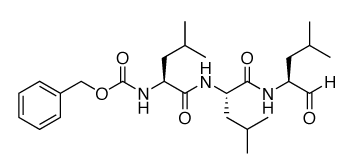MG-132
-
Cat.code:
tlrl-mg132-2
- Documents
ABOUT
26S proteasome inhibitor
MG-132 is a peptide aldehyde (Z-Leu-Leu-Leu-al) that selectively blocks the proteolytic activity of the 26S proteasome. The 26S proteasome is a large protease complex that degrades ubiquitinated proteins into smaller peptides. It plays a central role in the regulation of proteins that control cell-cycle progression and apoptosis.
Mode of action:
MG-132 reduces the degradation of ubiquitin-conjugated proteins in mammalian cells by the 26S proteasome. This potent inhibitor is used as a tool for disrupting the proteasome-regulated degradation of intracellular proteins, such as IκB. Inhibition of IκB proteasomal degradation by MG-132 leads to the suppression of NF-κB activation [1].
Of note, studies suggest that inhibition of the 26S proteasome by MG-132 can induce autophagy by stabilizing Atg protein levels [2].
Key features:
- A potent inhibitor of the 26S proteasome
- An autophagy inducer
- InvitroFit™ grade: each lot is functionally tested
References
1. Lee DH, Goldberg A.L., 1998. Proteasome inhibitors: valuable new tools for cell biologists. Trends Cell Biol. 8(10):397-403.
2. Ge PF. et al., 2009. Inhibition of autophagy induced by proteasome inhibition increases cell death in human SHG-44 glioma cells. Acta Pharmacol Sin. 30(7):1046-52.
All products are for research use only, and not for human or veterinary use.
InvitroFit™
InvitroFit™ is a high-quality standard specifically adapted for in vitro studies of inhibitors. InvitroFit™ products are highly pure (≥95%) and guaranteed free of bacterial contamination, as confirmed using HEK Blue™ TLR2 and HEK Blue™ TLR4 cellular assays. Each lot is rigorously tested for functional activity using validated (or proprietary) cellular models. This grade ensures reliability and reproducibility for your research applications.
SPECIFICATIONS
Specifications
C26H41N3O5
Z-Leu-Leu-Leu-al
20 mg/ml in DMSO
200 ng/ml - 20 µg/ml (420 nM - 42 µM)
Negative (tested using EndotoxDetect™ assay)
In vitro cellular assays
Each lot is functionally tested and validated using cellular assays.
CONTENTS
Contents
-
Product:MG-132
-
Cat code:tlrl-mg132-2
-
Quantity:2 x 5 mg
Shipping & Storage
- Shipping method: Room temperature
- -20°C
- Avoid repeated freeze-thaw cycles
Storage:
Caution:
Details
26S proteasome
The 26S proteasome is a large, ∼2.5 MDa, multi-catalytic ATP-dependent protease complex [1, 2]. It is responsible for the degradation of cytosolic, nuclear, and membrane proteins in eukaryotic cells, which are targeted for degradation via polyubiquitination. Proteasome-mediated degradation plays a crucial role in maintaining cell integrity by eliminating misfolded and damaged proteins. Proteasome-dependent proteolysis is also essential to regulate a number of other cellular processes, such as cell differentiation, cell-cycle progression, or apoptosis. Proteins targeted for degradation are allowed inside the proteasome particle, where they are cleaved into small peptides and released in the cytosol to be degraded into amino acids. This amino acid pool is used for the synthesis of proteins and other nitrogen-containing compounds such as DNA bases, neurotransmitters, and hormones.
References:
1. Livneh I. et al., 2016. The life cycle of the 26S proteasome: from birth, through regulation and function, and onto its death. Cell Res . 2016 Aug;26(8):869-85.
2. Adams J., 2003. The proteasome: structure, function, and role in the cell. Cancer Treat Rev .29 Suppl 1:3-9.
Chemical structure of MG-132:

DOCUMENTS
Documents
Technical Data Sheet
Safety Data Sheet
Validation Data Sheet
Certificate of analysis
Need a CoA ?





